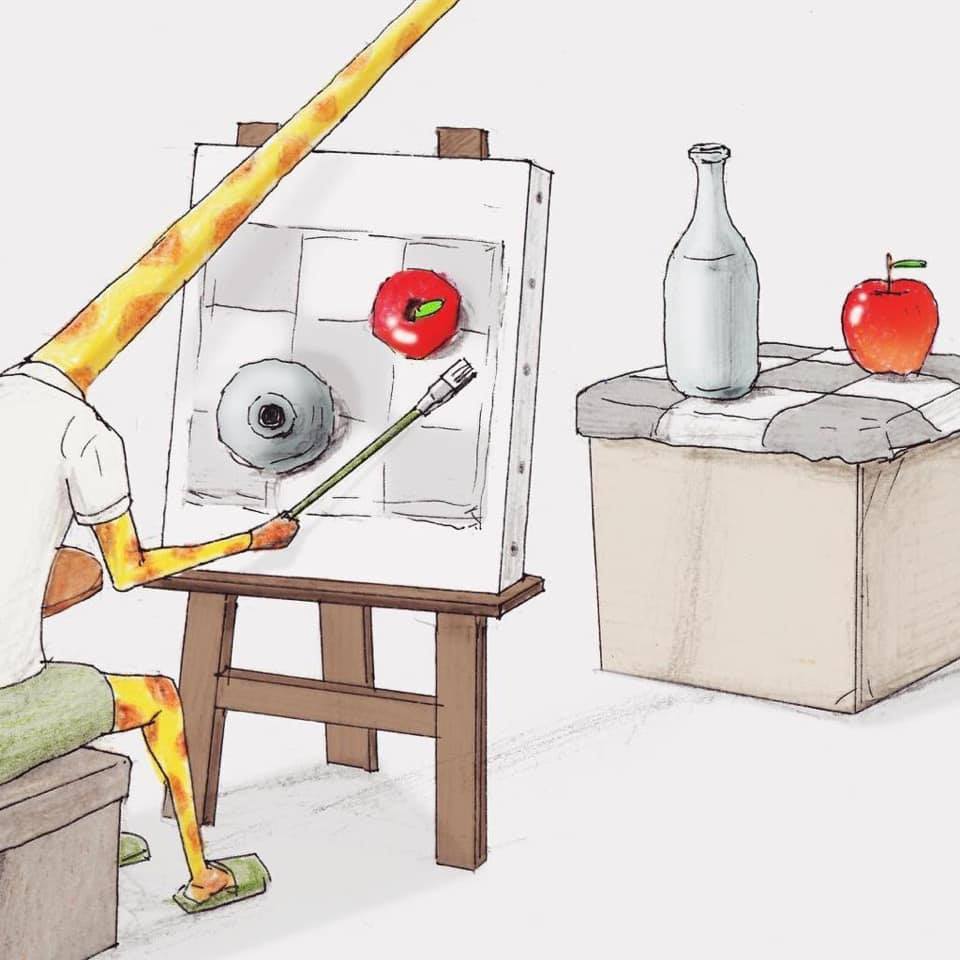
The Complaint by Deborah Beach Giordano
A Changed Viewpoint
Qoheleth (“the teacher”), the author of Ecclesiastes, tells us — in a bit of bragging, perhaps — that he has seen it all, done it all. Throughout a long, eventful life, he pursued education, wealth, wine, women, and song, denying himself nothing; achieving worldly greatness: building and amassing — and enjoying doing so. Yet now, from his current vantage point, Q (as I will call him, for simplicity’s sake) clearly sees that he was merely “chasing after the wind; nothing was gained under the sun.” Nothing is secure, nothing is meaningful, nothing lasts, nothing remains, nothing matters. Life goes on in its endlessly repeating cycles. God is out there, but … well, precisely that: out there — distant, inaccessible, inscrutable.
 It’s hard to refute Q’s message, especially in the midst of our current situation. Who would challenge “the teacher”? The evidence he presents is so compelling. He is so authoritative, so self-assured, so convincing.
It’s hard to refute Q’s message, especially in the midst of our current situation. Who would challenge “the teacher”? The evidence he presents is so compelling. He is so authoritative, so self-assured, so convincing.
The problem is, he is mistaken. He only thinks he sees all and knows all.
Perfect Clarity?
No longer young or strong, living in exile (a deposed “king of Israel”), far from all that he knew and loved and possessed, overwhelmed by loss, sadness, and circumstance, Q views all that went before, all his efforts — all human efforts — as futile and pointless.
All is for naught; everything under the sun turns to dust and ashes.
But Q is not proclaiming holy Wisdom; he is giving voice to the grief and frustrations of his anxious and weary Self. Q is telling us that he is profoundly depressed. And that’s ok. It’s true. It’s important. It’s good to hear somebody else say what we feel in the midst of chaos and instability. We are not alone.
But just because it is a common, powerful sense-experience doesn’t mean it is The Truth. Sometimes it means we’ve lost our sense of perspective.
What You See…
 Our view of the world is derived from our outlook; from the way we see things. This perspective is both formed and distorted by our past history, our current situation, by the information we receive and believe. All of these things, taken together, are shaped into what think we know by the Self. This is the “I” that decides and chooses; that directs the Will that determines how we shall act; the Mind that seeks to understand and influence the world around us.
Our view of the world is derived from our outlook; from the way we see things. This perspective is both formed and distorted by our past history, our current situation, by the information we receive and believe. All of these things, taken together, are shaped into what think we know by the Self. This is the “I” that decides and chooses; that directs the Will that determines how we shall act; the Mind that seeks to understand and influence the world around us.
Also termed the Ego, it is the intrinsic sense of me-ness that distinguishes us from others; the individuality that both empowers us and isolates us. This Self is what makes us who we are, and cannot be excluded or excised, and certainly doesn’t deserve condemnation. The trouble arises when we succumb to that sly Tempter’s deception: “You can be as gods!”
When we put our faith in our Self, and it alone, then we lose our perspective.
To trust in our own knowledge, power, and understanding alone, investing our Self with godlike authority, is to follow the pathway to despair. Things will happen that are beyond our ability to comprehend or control, and the Ego cannot cope. After running through the gamut of reasoning, rationales, excuses, frantic efforts, accusations, and denials…. this belief system collapses and we slide into hopelessness and despair.
Help is On the Way!
 All is not lost, however — although it definitely can feel that way. We can see the Light begin to dawn as our friend Q slogs his way through the Slough of Despond for, at the conclusion of his complaint, he confesses, “to ask ‘why’ is vanity.”
All is not lost, however — although it definitely can feel that way. We can see the Light begin to dawn as our friend Q slogs his way through the Slough of Despond for, at the conclusion of his complaint, he confesses, “to ask ‘why’ is vanity.”
This may seem a strange statement. You’d think that Q will call upon God’s mercy in his yearning and desperation. But for an Ego that has claimed divine status, a needful first step may be to humbly admit that we cannot even begin to approach the Wisdom of God; it is beyond our knowing or imagining.
Q rightfully dismisses the “why” question; the great response is his Yes — his affirmation of being: of living life in the midst of crazy, confusing, inexplicable times with God as his witness. He doesn’t pretend that everything is roses and raspberries, but says right out loud that the situation is miserable: he misses what was, and sees everything he once thought so essential, the accomplishments he worked so hard to achieve, are “as empty air.”
And he lives. He sees with new eyes; he understands life from a new perspective. He complains, but he does not surrender, he does not give up. He takes what he has learned and carries it forward: it has become not a tragedy, but a lesson — and Q not a victim, but a teacher.
The Beginning of Wisdom
In this awakening Qoholeth is no longer a former king of Israel, not Mr. Know-It-All, Seen-It-All, but a fellow being. We know him, intimately, personally, in the experience of shared humanity; in a circumstance of loss, confusion, and anxiety. He — and we — realize that what matters are heavenly treasures, not earthly ones. But importantly, and beyond this, Q has discerned the necessity of finding joy, and he realizes that this comes “from the hand of God.”
There is nothing better for mortals than to eat and drink, and find enjoyment in their toil. This also, I realized, is from the hand of God; for apart from Him who can eat or who can have enjoyment? (2:24-26)
Here is true Wisdom — true spiritual/divine understanding: it is not in the getting and having, not in the achieving that we should base our happiness and our sense of Self. As the old saying has it: Don’t sweat the small stuff…. and it’s all small stuff. (Emphasis on stuff.) Things are mere incidentals, nice to have, perhaps, but not how we should define ourSelf (emphasis on Self). It is not in our achieving, but — as Q describes it — in our “toil”: in the task that God gives to us.
“Not my will, but Thine.”
~ the Lord Christ
When the Self takes its direction from the Higher Power and ceases trying to play God, life falls into place. Meaning is revealed. To live with joy is to live with awareness of our purpose: the purpose God has assigned to us — which may (very likely) not be the same purpose we would have assigned to ourselves.

We shall have wisdom and shall find enjoyment when we understand that we have been given a task: a holy task offered to us from God. It is a call we can answer — or refuse; a holy work that can feel like “toil”: not easy, not always pleasant, but meaning-full, if we see it from the Divine perspective.
Our old friend Q took what had been a disaster and turned it into a Lesson, and repurposed himself as a teacher. The loss of all that he had known was not the end of the world, but a new beginning, bringing a new perspective; the start of a new life, filled with meaning. And so can it be for us: our tremendously changed world offers us an opportunity for improved understanding, fierce tenacity, and unflagging courage. In short: a meaningful life awaits us — if we so choose.
May the Lord bless you and keep you; may the Lord cause His face to shine upon you and be gracious to you; may the Lord lift up His countenance toward you and give you peace,
Deborah ✟
Suggested Spiritual Exercise
Take courage, and do not be afraid.
This is the day that the Lord has made; we will rejoice and be glad in it. O Lord, save us, we pray. We implore You, O Lord, give us success!
~ Psalm 118:24-25